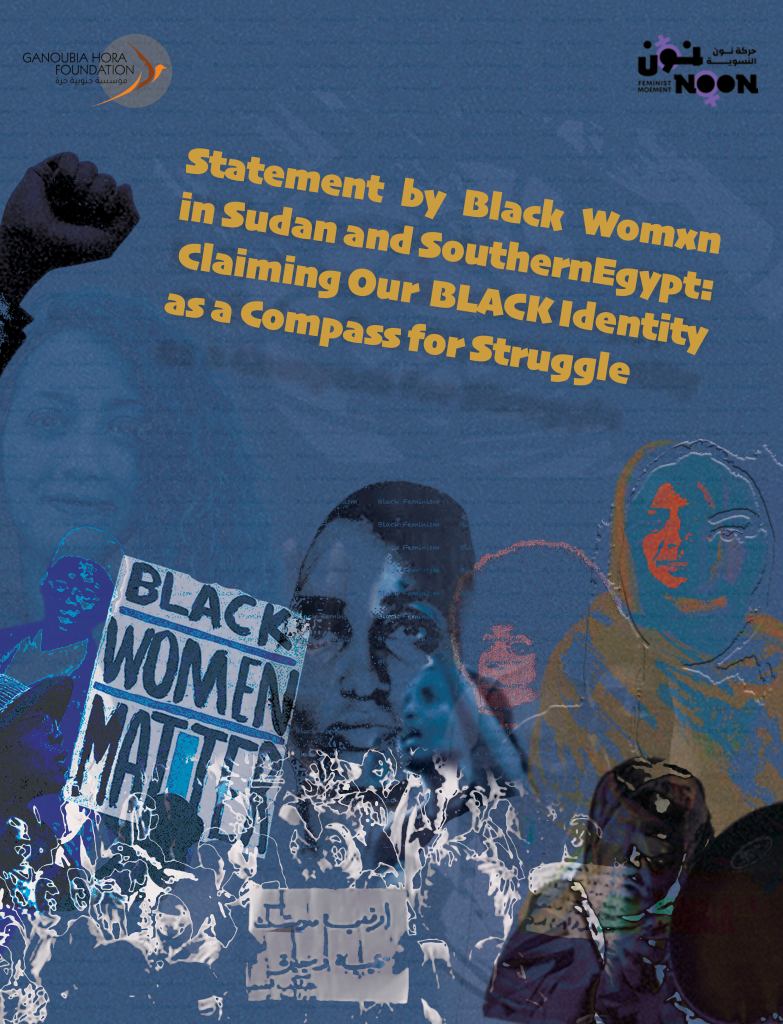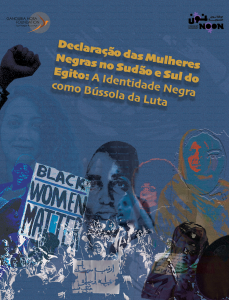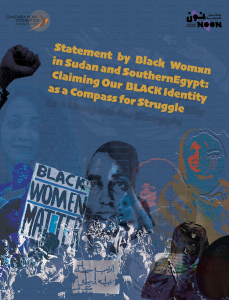We, the Noon Feminist Movement, representing Sudanese Black Womxn and every Arabic-speaking Black Womxn, and in collaboration with the Ganoubia Hora Foundation in Upper Egypt, issue this statement from our position as womxn confronting—alongside all Black womxn and communities in the region—layered forms of oppression: from war, displacement, and systemic violence in Sudan to class-based, racial, and tribal discrimination deeply rooted in southern Egypt and the broader region governed by Arab systems.
We affirm our commitment to our Black identity as an act of resistance and liberation and as a reminder that our just cause lies in the complex intersections of race, gender, and authoritarian centralism. We aim to dismantle the tools of patriarchy and to lay the foundations for gender equality and racial justice.
Here, we assert our commitment to the legacy of Black feminist resistance and summoning the voice of the margin; for us, it’s the center from which we build a transnational network of solidarity that rejects all illusions that fragment our belonging and keep systems of oppression intact.
1. Black Identity as a Political Force and a Framework for Liberation
Are we Black womxn?
This question is not a passing inquiry; it is an invitation to reflect deeply on our identity and our shared history. In an era of neo-colonialism and renewed imperialism, it has become necessary to reconsider how we understand ourselves and how we connect our Black identity to our daily experiences in societies that constantly reproduce marginalization and discrimination.
For decades across the plains of Damazin, the Marrah mountains, in Khartoum and Nyala, and in the villages of Asyut, Qena, and Sohag, we have carried stories that form a political and historical identity that cannot be fragmented.
We are descended from womxn who plowed, harvested, and resisted; womxn who stood tall in the face of colonialism, enslavement, and discrimination. Our Black identity is the force that guides this struggle; No oppression can silence the voice of Black womxn anywhere.
Yes, we are. And we refuse to be nothing other than proudly Black womxn.
2. The Legacy of Resistance and the Black Feminist History
The voices of every Sudanese and black Egyptian womxn living daily under structural oppression are an extension of our long struggle against racism, anti-blackness, patriarchy, and the lingering impact of colonialism and its renewed instruments. It affirms that dignity and freedom are inherent rights, not privileges to be granted or withdrawn.
This black African feminist legacy obligates us to rebuild our sense of belonging as part of a historical and global resistance.
3. Structural Violence and the Intersections of Discrimination
What our people have historically endured, from systematic racial & ethnic SGBV-based violence to economic marginalization and cultural exclusion, is not a collection of isolated incidents. It is deeply rooted in anti-blackness and the targeting of Black womxn specifically: Those from the margins, outside circles of power and privilege. Black womxn and communities in geographically marginalized areas (like southern Egypt) face compound forms of discrimination.
4. Cross-Border Solidarity Toward an Intersectional Feminist Liberation
Our solidarity with Black womxn in Brazil and everywhere is, in essence, a recognition that what binds us is our shared identities. It is a political act that affirms that racial justice is a transnational struggle.
This solidarity extends to our Black and feminist womxn and communities in the SWANA and Arabic-speaking African region who face violence, discrimination, and repression under systems that claim “Arab identity” as a shield. The presence of comrades who work on racial justice in prison, or the threat of arrest hanging over them, shows that central authorities deploy the tools of repression and racism to target the free voices that refuse the dominance of a single identity. and also extend to our black African siblings who are struggling under modern slavery known as the kafala system.
It is time to find what unites us, instead of constantly seeking external individual or collective validation. From this standpoint, our feminist liberation is intersectional: it declares that there is no freedom for us without the freedom of all those oppressed on the basis of race, gender, or class.
A Pledge to the Future
We call on all Black womxn in the Nile Valley and everywhere, to build strong, cross-regional and transnational black feminist networks of support and solidarity, defending life and dignity and rejecting all forms of exploitation and domination.
We affirm our unwavering commitment to continue our struggle as long as systems of oppression stand. We will write, dream, and resist, guided by our Black identity as a compass of liberation and striving for a free and dignified world where the voices of Black womXn are heard without fear or guardianship.
Issued by:
Sudanese Feminist Movement Noon, in collaboration with the Egyptian organization Ganoubia Hora Khartoum / Cairo — November 2025



